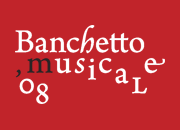September 25, Saturday, 6 pm
Museum of Applied Art, Arsenalo g. 3A
O come sei gentile
Italian madrigalists at the Royal Court of the Commonwealth of the Two Nations
ENSEMBLE VOCALE VENETO Italy
- Lavinia Bertotti – soprano
- Cristina Miatello - soprano
- Paolo Costa - alto
- Michele Da Ros – tenor
- Andrea Favari - bass
- Roberto Loreggian - harpsichord
This programme has been conceived as a journey to the madrigal production of the Italian
musicians who, for 70 years starting at the end of the 16th century, devoted most of their
composing activity to this vocal repertoire. There’s yet one particularity: the programme
presents works of only those Italian composers that for some period lived or worked at the
Court of the Commonwealth of the Two Nations. It was the epoch when Italian culture spread
all over the Europe, as witnessed particularly by the music. The relations between such a
superpower as the Commonwealth of the Two Nations and the musicians, who were invited to
move to Warsaw, have left the traces of fruitful contacts that could now be renewed and
rediscovered.
The king Sigismund III, throned in 1587, moved the capital from Cracow to Warsaw in 1595, and
started a grand project of city development, emulating Rome, and inviting to Poland architects
and musicians, especially from the Roman area.
Indeed, Luca Marenzio, even though born in Coccaglio, near Brescia, worked in Rome for important
prelates, and it was the cardinal Aldobrandini who proposed him as an expert at church repertoire
to the Polish ruler. Some compositions of this Lombardic madrigalist had already been published
in Italy before 1595, when the artist left for Warsaw. There he stayed for a couple of years and
probably brought his music, which was already well-known in Northern Europe by means of the widely
spread Italian musical press.
Tarquinio Merula, Cremona-born, lived in Sigismund’s court presumably between 1621 and 1626, and
his madrigal “Andianne agli horti di Dameta”, dates back to 1624. The celebrated organist and
composer dedicated a number of interesting vocal and instrumental compositions to his patron.
Unfortunately, few of them have survived until now.
In 1624 also Marco Scacchi, born in Gallese di Viterbo, near Rome, came to the Court of Warsaw.
Initially he worked as a violinist, but later was appointed as master of the royal chapel choir,
and was praised both for his music and for theoretical works. He remained for many years at the
Court of Wùadysùaw IV, new king from 1633, and came back to Italy only in 1650.
His madrigals are a fascinating example of ancientness, with the classical 16th century use of
five voices, but also with novelties like the introduction of basso continuo, under the
influence of the “modern” Monteverdi.
Many texts for Scacchi’s polyphonic pieces were written by Giovanni Battista Guarini, a popular
Italian poet of the 17th century. His eminent predecessors, whose verse inspired lots of composers,
were Petrarca and Tasso.
In this programme the same poetic texts are presented with different intonation, in order to
stimulate an interesting comparison between Scacchi, Marenzio and Monteverdi.
All the members of Ensemble Vocale Veneto, founded in 1999, have been performing many years both solo and with various early music ensembles and have been internationally acclaimed by audience and critics. In 2003 the ensemble participated in the Europalia – Italia festival and gave six concerts in the main Belgian cities with three different programmes dedicated to the madrigal repertoire, developed in the second half of the 16th century, in the Court of Este, Ferrara. The ensemble has recorded a number of CDs in the most important early music record companies and has participated in innumerable TV and radio records all over Europe. Cristina Miatello, with the help of her colleagues, has revived polyphonic vocal compositions, some of which had never been performed.

